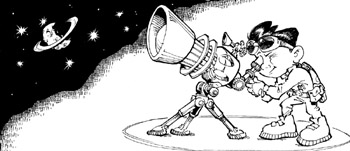Chapter 5: Focus
Overview

Feel the flow To become one with the flow is to realize purpose.
” Warrel Dane
Developing a game for two years with a team of twenty people typically more resembles war than the creation of art. Many would say that a decent amount of conflict can lead to great art, especially in collaborative forms such as modern commercial computer games . A stronger game may arise from the ashes of team members arguing over the best way to implement some aspect of gameplay. If the game merely becomes unfocused as a result of these squabbles, then a good game is not likely to emerge. Over the course of the many battles you must fight, skirmishes you must endure, and defeats you must overcome in the course of a game s development, with conflicts potentially arising with other team members or from within yourself, it is far too easy to lose track of just why you were creating the game in the first place. Is it possible that at one point the game you are working on captivated your imagination ? Was there some vision you had for why this game would be fun, compelling, and unique? Is it possible that at one point you actually liked computer games at all?
Sometimes in the middle of a project it is easy to get sidetracked ” sidetracked by technological obstacles that are thrown in your path , sidetracked by altercations between team members, or sidetracked when your publisher tells you features A, B, and C simply have to be changed. It is at these junctures where you come to doubt that your game will ever be fun, or whether it will even be completed. These periods of doubt are the ones that separate the good game designers from those who are merely passable. Good game designers will be able to overcome these difficulties and stay on track by remembering their focus.
The technique I explore in this chapter is certainly not one that all game designers use, but I think it is one that all game designers could benefit from. Many designers may use the technique but not realize it or have a different name for it. Others may have entirely different methods for assuring their game comes together as a fun, consistent whole. You cannot expect to go up to any game designer and say, What s your focus for your current project? and expect them to produce an answer in line with the method I explore in this chapter. But if you start being rigorous in maintaining focus in your projects, I think you will see very positive results in the final quality of your games.
EAN: 2147483647
Pages: 189